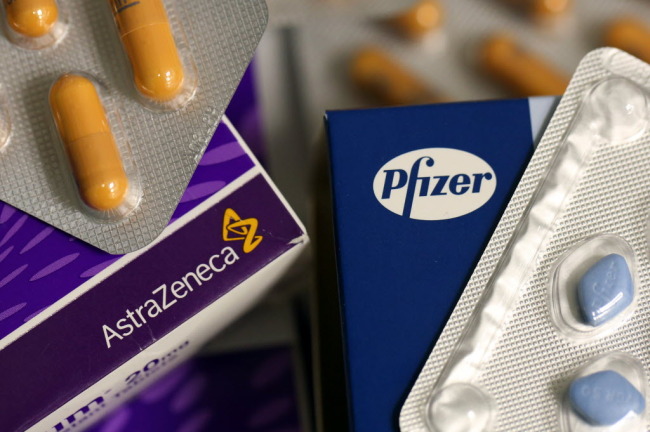Even in a high-stakes deal worth almost $120 billion, one that would create the world’s biggest drugmaker, the personal details matter.
In a postmortem of the failed takeover talks between Pfizer Inc. and AstraZeneca Plc, a surprise offer, disagreement over a press release and the difference between a personal visit and a telephone chat played a big role. Chinese food had a cameo.
“It’s sometimes not just about the money but about how you play the psychological issue behind a transaction,” said Daniel Galvan, a director at investment bank GBS Finanzas in Madrid. “Pfizer could have had softer manners when approaching AstraZeneca.”
Pfizer ended its six-month effort to buy AstraZeneca Monday following the London-based company’s May 19 rejection of its last bid of 55 pounds ($93) a share in cash and stock. While U.K. takeover law prohibits Pfizer from making a new, unsolicited offer for the next six months, the deal could be revived in three months if AstraZeneca invites talks.
 |
Logos of Pfizer and AstraZeneca are seen on boxes of pharmaceutical products in London. ( Bloomberg) |
In the aftermath, the recriminations have begun and questions raised about New York-based Pfizer’s tactics. In AstraZeneca’s eyes, Pfizer turned a supposedly friendly deal into a hostile one, alienating its board, according to people with knowledge of the matter who asked not to be identified.
For its part, Pfizer wasn’t convinced that AstraZeneca was serious about negotiating, especially near the end of the process, the people said. Given AstraZeneca’s quick rejection of prior bids, Pfizer hoped its last offer might get the U.K. firm’s shareholders to pressure the company to agree to new talks.
Representatives for Pfizer and AstraZeneca declined to comment beyond the public statements.
The negotiations began last November when Pfizer chief executive officer Ian Read, who turned 61 Monday, approached AstraZeneca about a possible transaction. Pfizer would transfer its headquarters to the U.K. to gain a lower tax rate, add new cancer drugs to its pipeline and take advantage of cost reductions from overlapping operations.
By January, AstraZeneca CEO Pascal Soriot, 55, and Chairman Leif Johansson, 62, were intrigued enough to fly to New York to meet with the Pfizer CEO, where they gathered at The Pierre hotel overlooking Central Park. There, they received an offer of 46.61 pounds a share. While it was about 30 percent above AstraZeneca’s stock price, Soriot rejected it. Rather than pursue a deal further, Pfizer decided to walk away, to the surprise of people close to AstraZeneca.
Over the next few months, however, the British firm reported positive news and pharmaceutical deals heated up. Soriot said in San Francisco on Jan. 14 that AstraZeneca’s revenue would rebound more quickly than analysts expected.
In April, Novartis AG agreed to buy GlaxoSmithKline Plc’s cancer drugs while selling most of the company’s vaccines division to Glaxo and its animal-health unit to Eli Lilly & Co., in an industrywide shake up. And Valeant Pharmaceuticals International Inc. offered to buy Allergan Inc., maker of the Botox wrinkle treatment. (Bloomberg)








